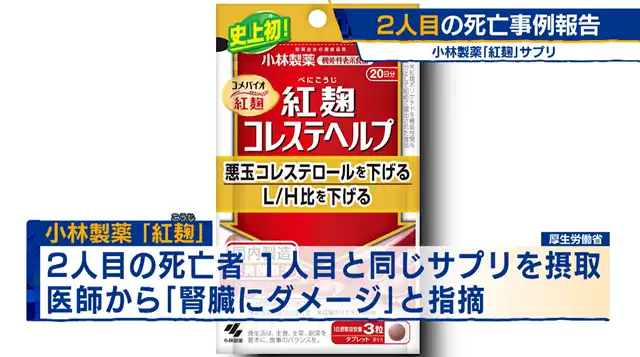Second Death Linked to Red Yeast Rice Supplement Reported in Japan
- Normal Liver Cells Found to Promote Cancer Metastasis to the Liver
- Nearly 80% Complete Remission: Breakthrough in ADC Anti-Tumor Treatment
- Vaccination Against Common Diseases May Prevent Dementia!
- New Alzheimer’s Disease (AD) Diagnosis and Staging Criteria
- Breakthrough in Alzheimer’s Disease: New Nasal Spray Halts Cognitive Decline by Targeting Toxic Protein
- Can the Tap Water at the Paris Olympics be Drunk Directly?
Second Death Linked to Red Yeast Rice Supplement Reported in Japan
- Should China be held legally responsible for the US’s $18 trillion COVID losses?
- CT Radiation Exposure Linked to Blood Cancer in Children and Adolescents
- FDA has mandated a top-level black box warning for all marketed CAR-T therapies
- Can people with high blood pressure eat peanuts?
- What is the difference between dopamine and dobutamine?
- How long can the patient live after heart stent surgery?
Second Death Linked to Red Yeast Rice Supplement Reported in Japan
Safety Concerns Mount Around Kobayashi Pharmaceutical’s “Beni Koji Cholesterhelp” Supplement.
On March 27th, 2024, Kobayashi Pharmaceutical Co., Ltd. (4967) announced a troubling development regarding their cholesterol-lowering supplement, “Beni Koji Cholesterhelp.” The company received a report of a second death associated with the product, raising concerns about its safety profile.
This news comes amidst a growing number of health complaints linked to Beni Koji Cholesterhelp, with the Ministry of Health, Labor and Welfare (MHLW) reporting over 100 hospitalizations and Kobayashi receiving over 3,600 inquiries regarding potential side effects.
This situation necessitates a closer look at the science behind red yeast rice, the primary ingredient in Beni Koji Cholesterhelp, and its potential health risks.

screenshot from youtube
Red Yeast Rice: A Popular Yet Controversial Cholesterol-Lowering Supplement
Red yeast rice is a fermented rice product containing monacolin K, a compound structurally similar to lovastatin, a prescription medication used to treat high cholesterol. Studies have shown red yeast rice to be moderately effective in lowering LDL (“bad”) cholesterol levels [1, 2]. However, concerns regarding its safety profile have been raised in recent years.
Potential Health Risks Associated with Red Yeast Rice
Several research papers published in prominent academic journals have highlighted potential risks associated with red yeast rice supplementation.
- Muscle Damage: A 2016 meta-analysis published in the Journal of the American College of Cardiology found an increased risk of muscle damage, including rhabdomyolysis, a potentially life-threatening condition, in individuals taking red yeast rice compared to placebo [3].
- Liver Damage: A 2013 study in the Annals of Internal Medicine reported several cases of liver injury associated with red yeast rice consumption, calling for further investigation into its hepatotoxic (liver-damaging) potential [4].
- Drug Interactions: Red yeast rice may interact with certain medications, including statins and immunosuppressants. A 2019 review article published in Pharmacological Research highlighted the importance of disclosing red yeast rice use to healthcare providers to avoid potential interactions [5].
Uncertainties and the Need for Further Investigation
While red yeast rice has shown some promise in lowering cholesterol, the reported deaths and hospitalizations associated with Beni Koji Cholesterhelp necessitate a thorough investigation by Kobayashi Pharmaceutical and the MHLW.
Several key questions remain unanswered:
- Dosage and Formulation: The specific dosage and formulation of red yeast rice used in Beni Koji Cholesterhelp are crucial factors in evaluating potential risks. Research suggests that higher doses and certain formulations may be associated with a greater risk of side effects [6].
- Contaminants: The presence of contaminants, such as citrinin, a mycotoxin produced during the fermentation process, could also contribute to adverse effects.
- Underlying Medical Conditions: The role of pre-existing medical conditions in individuals who experienced complications needs to be investigated.
The Importance of Patient Education and Regulatory Oversight
The Beni Koji Cholesterhelp case underscores the importance of patient education and responsible marketing of dietary supplements. Consumers should be aware of the potential risks associated with red yeast rice and consult healthcare professionals before using such products.
Regulatory bodies like the MHLW have a vital role in ensuring the safety and efficacy of dietary supplements. This includes stricter quality control measures, robust safety monitoring systems, and transparent reporting of adverse events.
Conclusion
The recent developments surrounding Beni Koji Cholesterhelp raise serious concerns about the safety of red yeast rice supplements. While red yeast rice may offer some cholesterol-lowering benefits, the potential for serious side effects necessitates caution.
Further research is crucial to better understand the risks associated with red yeast rice and to ensure the safety of consumers. Additionally, responsible marketing practices and robust regulatory oversight are essential to protect public health.
Note: This article is intended to provide a general overview of the current situation and the scientific literature surrounding red yeast rice. It is not a substitute for professional medical advice. Always consult your healthcare provider before starting any new supplement, including red yeast rice.
Second Death Linked to Red Yeast Rice Supplement Reported in Japan
References:
Wang, X., et al. (2008). Chinese red yeast rice for cardiovascular disease. Cochrane Database of Systematic Reviews, (4). PubMed: https://pubmed.ncbi.nlm.nih.gov/18843681
Becker, D. J., et al. (2009). Red yeast rice for dyslipidemia. Mayo Clinic Proceedings, 84(7), 590-600. PubMed: https://pubmed.ncbi.nlm.nih.gov/19596971
Mills, E. J., et al. (2016). Red
(source:internet, reference only)
Disclaimer of medicaltrend.org
Important Note: The information provided is for informational purposes only and should not be considered as medical advice.



